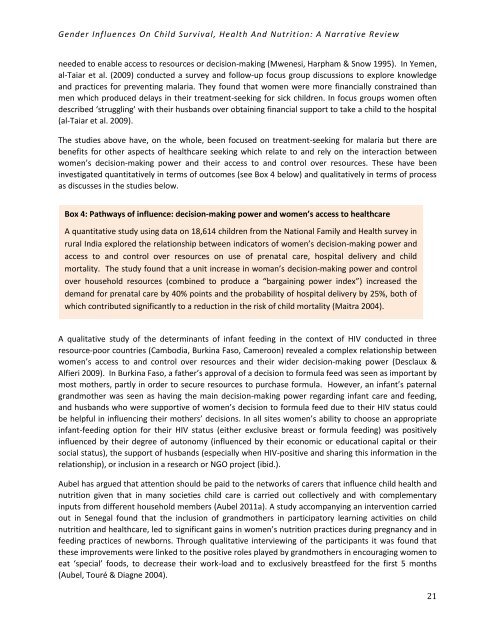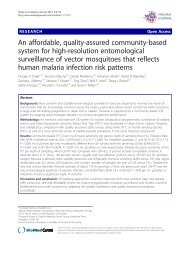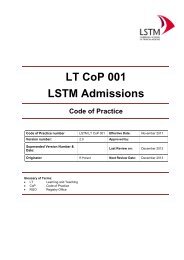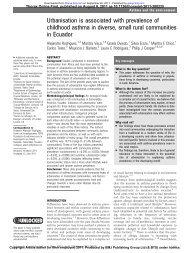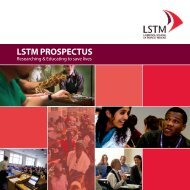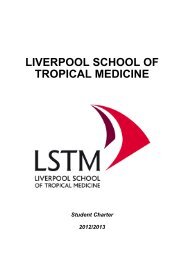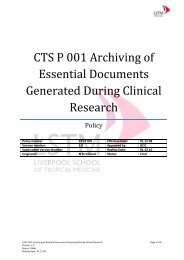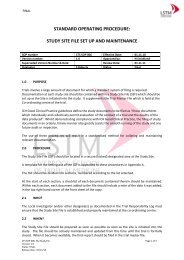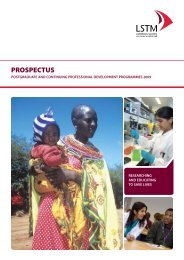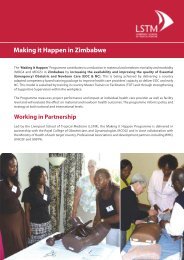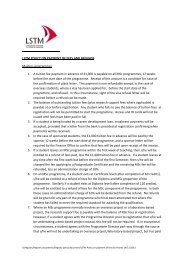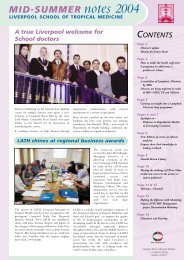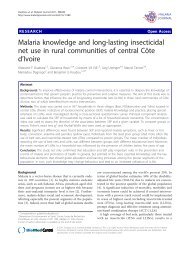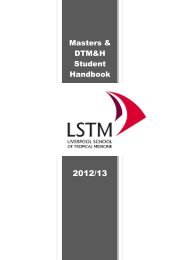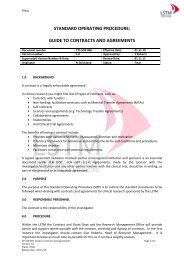Gender influences on child survival, health and nutrition: a ... - Unicef
Gender influences on child survival, health and nutrition: a ... - Unicef
Gender influences on child survival, health and nutrition: a ... - Unicef
You also want an ePaper? Increase the reach of your titles
YUMPU automatically turns print PDFs into web optimized ePapers that Google loves.
<str<strong>on</strong>g>Gender</str<strong>on</strong>g> Influences On Child Survival, Health And Nutriti<strong>on</strong>: A Narrative Review<br />
needed to enable access to resources or decisi<strong>on</strong>-making (Mwenesi, Harpham & Snow 1995). In Yemen,<br />
al-Taiar et al. (2009) c<strong>on</strong>ducted a survey <strong>and</strong> follow-up focus group discussi<strong>on</strong>s to explore knowledge<br />
<strong>and</strong> practices for preventing malaria. They found that women were more financially c<strong>on</strong>strained than<br />
men which produced delays in their treatment-seeking for sick <strong>child</strong>ren. In focus groups women often<br />
described ‘struggling’ with their husb<strong>and</strong>s over obtaining financial support to take a <strong>child</strong> to the hospital<br />
(al-Taiar et al. 2009).<br />
The studies above have, <strong>on</strong> the whole, been focused <strong>on</strong> treatment-seeking for malaria but there are<br />
benefits for other aspects of <strong>health</strong>care seeking which relate to <strong>and</strong> rely <strong>on</strong> the interacti<strong>on</strong> between<br />
women’s decisi<strong>on</strong>-making power <strong>and</strong> their access to <strong>and</strong> c<strong>on</strong>trol over resources. These have been<br />
investigated quantitatively in terms of outcomes (see Box 4 below) <strong>and</strong> qualitatively in terms of process<br />
as discusses in the studies below.<br />
Box 4: Pathways of influence: decisi<strong>on</strong>-making power <strong>and</strong> women’s access to <strong>health</strong>care<br />
A quantitative study using data <strong>on</strong> 18,614 <strong>child</strong>ren from the Nati<strong>on</strong>al Family <strong>and</strong> Health survey in<br />
rural India explored the relati<strong>on</strong>ship between indicators of women’s decisi<strong>on</strong>-making power <strong>and</strong><br />
access to <strong>and</strong> c<strong>on</strong>trol over resources <strong>on</strong> use of prenatal care, hospital delivery <strong>and</strong> <strong>child</strong><br />
mortality. The study found that a unit increase in woman’s decisi<strong>on</strong>-making power <strong>and</strong> c<strong>on</strong>trol<br />
over household resources (combined to produce a “bargaining power index”) increased the<br />
dem<strong>and</strong> for prenatal care by 40% points <strong>and</strong> the probability of hospital delivery by 25%, both of<br />
which c<strong>on</strong>tributed significantly to a reducti<strong>on</strong> in the risk of <strong>child</strong> mortality (Maitra 2004).<br />
A qualitative study of the determinants of infant feeding in the c<strong>on</strong>text of HIV c<strong>on</strong>ducted in three<br />
resource-poor countries (Cambodia, Burkina Faso, Camero<strong>on</strong>) revealed a complex relati<strong>on</strong>ship between<br />
women’s access to <strong>and</strong> c<strong>on</strong>trol over resources <strong>and</strong> their wider decisi<strong>on</strong>-making power (Desclaux &<br />
Alfieri 2009). In Burkina Faso, a father’s approval of a decisi<strong>on</strong> to formula feed was seen as important by<br />
most mothers, partly in order to secure resources to purchase formula. However, an infant’s paternal<br />
gr<strong>and</strong>mother was seen as having the main decisi<strong>on</strong>-making power regarding infant care <strong>and</strong> feeding,<br />
<strong>and</strong> husb<strong>and</strong>s who were supportive of women’s decisi<strong>on</strong> to formula feed due to their HIV status could<br />
be helpful in influencing their mothers’ decisi<strong>on</strong>s. In all sites women’s ability to choose an appropriate<br />
infant-feeding opti<strong>on</strong> for their HIV status (either exclusive breast or formula feeding) was positively<br />
influenced by their degree of aut<strong>on</strong>omy (influenced by their ec<strong>on</strong>omic or educati<strong>on</strong>al capital or their<br />
social status), the support of husb<strong>and</strong>s (especially when HIV-positive <strong>and</strong> sharing this informati<strong>on</strong> in the<br />
relati<strong>on</strong>ship), or inclusi<strong>on</strong> in a research or NGO project (ibid.).<br />
Aubel has argued that attenti<strong>on</strong> should be paid to the networks of carers that influence <strong>child</strong> <strong>health</strong> <strong>and</strong><br />
nutriti<strong>on</strong> given that in many societies <strong>child</strong> care is carried out collectively <strong>and</strong> with complementary<br />
inputs from different household members (Aubel 2011a). A study accompanying an interventi<strong>on</strong> carried<br />
out in Senegal found that the inclusi<strong>on</strong> of gr<strong>and</strong>mothers in participatory learning activities <strong>on</strong> <strong>child</strong><br />
nutriti<strong>on</strong> <strong>and</strong> <strong>health</strong>care, led to significant gains in women’s nutriti<strong>on</strong> practices during pregnancy <strong>and</strong> in<br />
feeding practices of newborns. Through qualitative interviewing of the participants it was found that<br />
these improvements were linked to the positive roles played by gr<strong>and</strong>mothers in encouraging women to<br />
eat ‘special’ foods, to decrease their work-load <strong>and</strong> to exclusively breastfeed for the first 5 m<strong>on</strong>ths<br />
(Aubel, Touré & Diagne 2004).<br />
21


